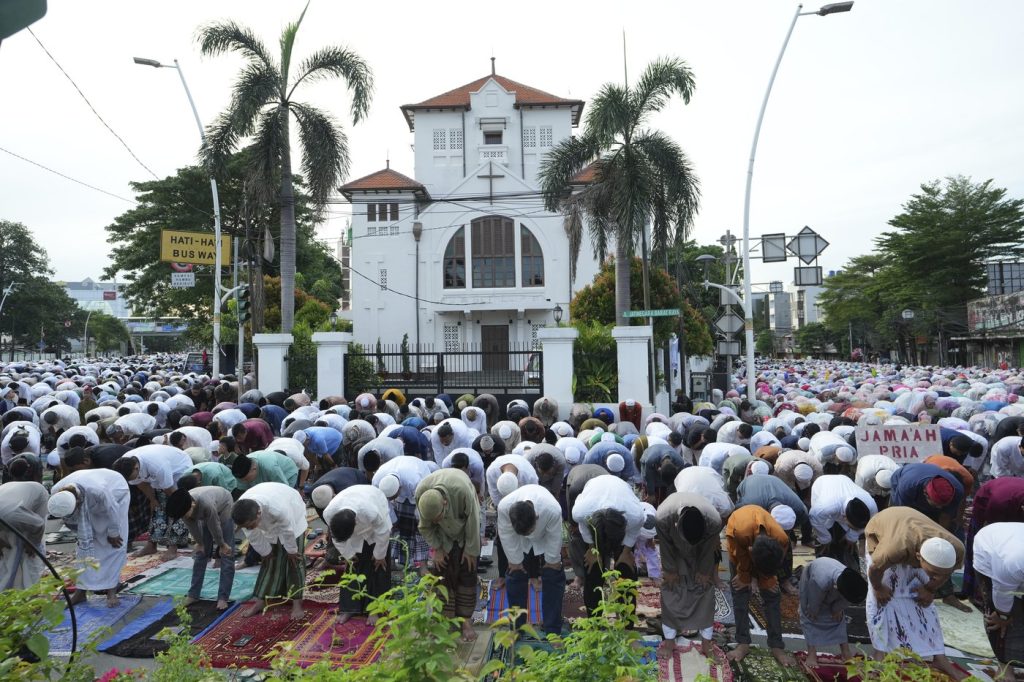JAKARTA, Indonesia (AP) — The festive mood associated with the Eid al-Fitr holiday, which marks the end of Ramadan, has significantly dimmed in Indonesia this year due to soaring prices for food, clothing, and essential goods. As people navigate economic hardships, consumer spending ahead of this major religious celebration, observed on Sunday, has declined in comparison to the previous year, leading to a predicted decrease in cash circulation driven by a reduction in travelers.
In Indonesia, nearly 75% of the population typically participates in “mudik,” the annual homecoming travel to celebrate Eid with family in their villages. This phenomenon creates a scene of excitement, with people eagerly leaving major cities for family gatherings, accompanied by prayers and feasts. Ordinarily, flights experience overbooking, and relatives carry heavy boxes of gifts while lining up at bus and train stations. However, this year, the Indonesian Transportation Ministry reported that Eid travelers totaled approximately 146 million, marking a 24% decline from 194 million in the previous year.
The Indonesian Chamber of Commerce and Industry estimates that money circulation during Eid will reach around 137.97 trillion rupiah (approximately $8.33 billion), down from 157.3 trillion rupiah the year before. This decline in consumer spending is further evidenced by Bank Indonesia’s Consumer Confidence Index, which fell to 126.4 in February from 127.2 in January. Bhima Yudistira, the executive director of the Center for Economic and Law Studies (Celios), attributed these trends to economic strain brought on by financial difficulties, currency depreciation, and widespread layoffs in the manufacturing sector. He expressed concerns about the festive season being less vibrant, noting that “the spirit has been stifled by harsh economic realities.”
In light of these circumstances, Yudistira emphasized that soaring prices and shrinking incomes are compelling residents to prioritize basic survival necessities over celebrations. Historically, household consumption has been a vital contributor to Indonesia’s GDP, playing a role in the annual growth rate of 5.11% last year. However, he predicts that consumer spending will remain subdued in 2025.
Despite the ongoing economic challenges, the government remains hopeful that the momentum from Ramadan and Eid will contribute positively to economic growth in the first quarter of 2025. Chief Economic Affairs Minister Airlangga Hartarto stated that Eid generally stimulates the economy through increased spending. To support this, the government has recently introduced various initiatives aimed at boosting economic activity, such as discounts on airfare and toll road fees, nationwide online shopping events, direct cash assistance for 16 million households, reduced electricity bills for low-consumption customers, and tax exemptions for labor-intensive sectors.
The economic strain has affected many families across the nation, including Endang Trisilowati, a mother of four, who shared her family's struggles to adjust their festive budget. “Honestly, the economic hardship is affecting us,” Trisilowati lamented. Previously, she would prepare multiple dishes and invite neighbors over for Eid, but now she can only afford simple meals for her own family. “Many have resorted to just finding a way to eat on that festivity, but the spirit is low,” she added, highlighting the shift in focus from celebration to basic sustenance amidst rising costs.










